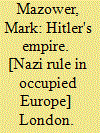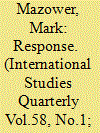| Srl | Item |
| 1 |
ID:
084927


|
|
|
|
|
| Publication |
London, Allen Lane, 2008.
|
| Description |
xl, 725p.: ill., maps.Hbk
|
| Standard Number |
9780713996814
|
|
|
|
|
|
|
|
|
|
|
|
Copies: C:1/I:0,R:0,Q:0
Circulation
| Accession# | Call# | Current Location | Status | Policy | Location |
| 054046 | 940.532243/MAZ 054046 | Main | On Shelf | General | |
|
|
|
|
| 2 |
ID:
069778


|
|
|
| 3 |
ID:
131013


|
|
|
|
|
| Publication |
2014.
|
| Summary/Abstract |
Weiss and Wilkinson ask us to figure out how to give greater precision to the concept of "global governance" in order better to understand how the world is run and perhaps also to have greater hope of changing it in the way we would like. This approach assumes that the concept is worth sticking with. I find myself unsure of this.
On the one hand, as they point out, international affairs did acquire a greater degree of functional complexity toward the end of the twentieth century as a variety of nonstate actors took on global roles and states themselves became umbrella rubrics for ever proliferating agencies and ministries with international competences. There is no question that Realism in particular was poorly equipped to understand this 'new world order'.
|
|
|
|
|
|
|
|
|
|
|
|
|
|
|
|
| 4 |
ID:
095430


|
|
|
|
|
| Publication |
2010.
|
| Summary/Abstract |
O n November 9, 2001, George W. Bush created a new public holiday-World Freedom Day. The United States, he explained, would lead the global fight for "liberty, freedom and the universal struggle for human rights"; it would try to help the "more than two billion people" still living under repressive regimes. The idea that America could, or should, do this had informed a certain kind of Washington mind-set throughout the Cold War. But after the Berlin Wall came down, freedom's crusaders increasingly set their eyes not so much on Communism as on violators of human rights in general. They unfurled the banner of humanitarianism and, righteously, scorned the cowards and skeptics who wanted to keep America's powder dry.
|
|
|
|
|
|
|
|
|
|
|
|
|
|
|
|